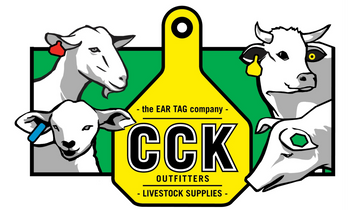Mastering Ear Tagging: Your Guide to Applicators and Proper Tag Application & Identification
Sep 03, 2025
Mastering Ear Tagging: Your Guide to Applicators and Proper Tag Application
Effective herd management starts with clear, secure identification — and ear tags are the cornerstone of this process. Whether you're new to tagging or looking to refine your technique, understanding which applicators work best with your tags can make all the difference.
Identification Done Right
For a successful tag application, you must use the manufacturer's applicator made to apply their ear tags.
Often customers have forgotten the brand of ear tags they use. A quick way to identify who made your ear tags is to look at the ear tag applicator you use. For instance, if you have a blue applicator, you used Y-Tex All American 2 Piece ear tags. A red applicator, you used an Allflex Global 2 Piece Ear Tag.
Each Manufacturer has designed their applicator to work a specific way with their tags. A Y-Tex 2 piece applicator has a hollow applicator pin that engages with a male piece inside the button stem. If you use the wrong applicator with a solid applicator pin (Allflex or ZTag) you will score the stem of the button, and it will crack over time, and the button will break. Likewise, if you use the Y-Tex applicator with the hollow pin to apply an Allflex of Ztag that needs the solid pin, you will encounter the same problem inside the button stem. The right applicator matters in the application process.
The Right Applicator for Your Tags
At CCK Outfitters, we offer a variety of applicators designed to match specific manufacturer ear tags. Knowing your applicator’s color is a key to help you select the correct tags for a quick, secure, and long-lasting fit.
Here’s a quick guide:
-
Yellow Applicator: Designed for Y-Tex Ytags 1-piece tags and Feedlot tags.
-
Orange Applicator: Designed for Y-Tex 2-piece ear tags.
-
Blue Applicator: Designed for Y-Tex 2-piece ear tags.
- Gray Applicator: Designed for Y-Tex 2-piece and EID tags

-
Gray & Blue Applicator: Works with Allflex 2-piece and EID ear tags.
-
Red Universal Total Tagger: Designed for Allflex 2-piece ear tags.
-
Yellow Applicator: Designed for Allflex Atags 1-piece tags & feedlot tags.

-
Black & Red Applicator: Designed for ZTAG 2-piece ear tags & Temple Ear Tags.
- Black Applicator: Designed for ZTAG 1-piece tags.
-

-
Ritchey Applicator: Uses a red Allflex or blue Y-Tex Ultra Tagger applicator with a Ritchey tool pin installed.
Tagging Tips for a Professional Finish
Achieving a secure and properly placed ear tag is essential. Follow these tips:
-
Placement: Position the tag in the middle third of the ear, where the cartilage provides sturdy support.

-
Attachment Security: Match the manufacturer's applicator tool to their ear tags for a tight, reliable fit that won’t fall off.
- Record Every Tag: Keep thorough records linking each tag to its animal for seamless herd management.
Why the right Applicator Matters
Matching your tags with the correct applicator ensures:
- Durability: Properly applied tags last longer.
- Animal Comfort: Correct placement reduces discomfort.
- Record Accuracy: Secure tags reduce loss and misidentification.
Here’s a handy reference:
| Applicator Color | Compatible Tags |
|---|---|
| Yellow | Y-Tex Ytags, Allflex Atag 1-piece |
| Orange | Y-Tex 2-piece ear tags |
| Blue | Y-Tex 2-piece ear tags |
| Gray | Y-Tex 2-piece, EID |
| Black & Red | ZTAG 2-piece ear tags |
| Gray & Blue | Allflex 2-piece, EID ear tags |
| Red | Allflex 2-piece ear tags |
| Black | ZTAG 1-piece tags |
Special Note on 1 Piece Ear Tags
All 1 Piece Ear Tags and feedlot tags are compatible with all 1 piece applicators on the market. For example, you can use a ZTag 1 Piece ear tag applicator to apply ATags or YTags.
To Sum It Up
Proper ear tagging is a small step with a big impact on your herd’s health management. By selecting the right applicator made for you ear tags and following best practices, your tags will stay secure, legible, and functional for the long haul.

